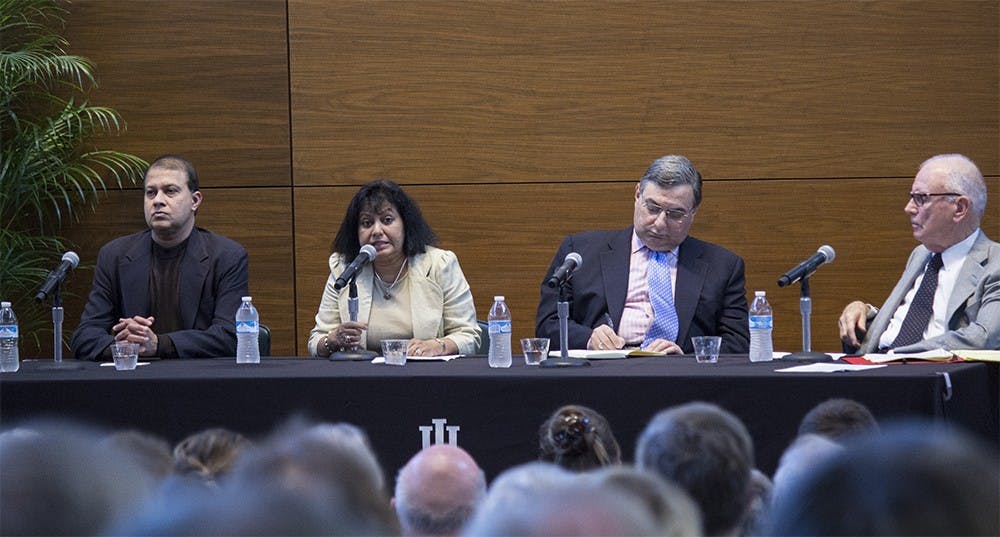Audience members filled all the seats in the auditorium, lined the walls and occupied several overflow rooms playing a livestream of the event.
The panel discussed details of the deal, as well as perspectives on the deal from congressional, Iranian and, more broadly, regional Middle Eastern points of view. Lee H. Hamilton, panelist and distinguished professor of practice in the School of Global and International Studies, said the goal of the panel was to increase understanding of the deal.
Hamilton said the deal effectively freezes Iran’s nuclear program for 15 years in exchange for the gradual lifting of economic sanctions. He said he supported the deal, even though he said he felt it is not perfect.
“It took a long time to reach an agreement, so every one of us could suggest improvements,” Hamilton said. “There are risks to it, but I think it is a worthy deal, and I do think it prevents Iran from becoming a nuclear state for the next 15 or 20 years. So, I think it serves our security interests and the security interests of our partners.”
Claire Bessette, a student who attended the panel, said she came to learn more about the deal.
“I think it’s something that affects all of us, whether we know it or not, and I think we should all be informed on it before making decisions,” Bessette said.
Hamilton contributed thoughts on the deal from an American lawmaker’s perspective. The deal faces the possibility of failing to make it through a vote by Congress this week, which he said he felt made the panel especially relevant.
“There’s a lot of difference of opinion with regard to the agreement,” Hamilton said. “The politics of it are very intense. Public opinion is evenly divided. Many people are undecided, and I thought the dean of the school, Mr. Feinstein, thought it would be a good time to have a discussion of it, and I agreed with him.”
If the deal is rejected by Congress, Hamilton said he felt it would damage the United States’ reputation as a world power, showing the U.S. to be undependable. He also said the United States would walk away from the deal alone.
“Other powers are going to continue enforcing the agreement,” Hamilton said. “A rejection of the agreement puts us on a path to more conflict, if not the outbreak of military action. There would be great uncertainty that would lead to mounting pressure to use military force. “
Asma Afsaruddin, panelist and professor of near Eastern languages and culture, traveled to Iran to receive an award in February. She contributed the perspective of Iranians, not only on the deal, but also on relations with the West and, specifically, the U.S.
She said there is a strong desire among the intellectual Iranians to whom she spoke for normalization of relations with the West, which would mean freer exchanges of ideas and travel between the two countries.
During the panel, Asma referenced the celebrations of the deal by Iranians in the streets of Tehran where people waved both Iranian and American flags. She said she felt those demonstrations speak volumes about the new direction the two countries could be headed in the near future.
In the Q&A following the panel, a student studying Farsi and Iran asked if the deal would allow study abroad in Iran in the near future. The panelists said such travel would require more diplomatic steps, but they also said IU has a long tradition of working with Iran and would be happy to continue working with them.






